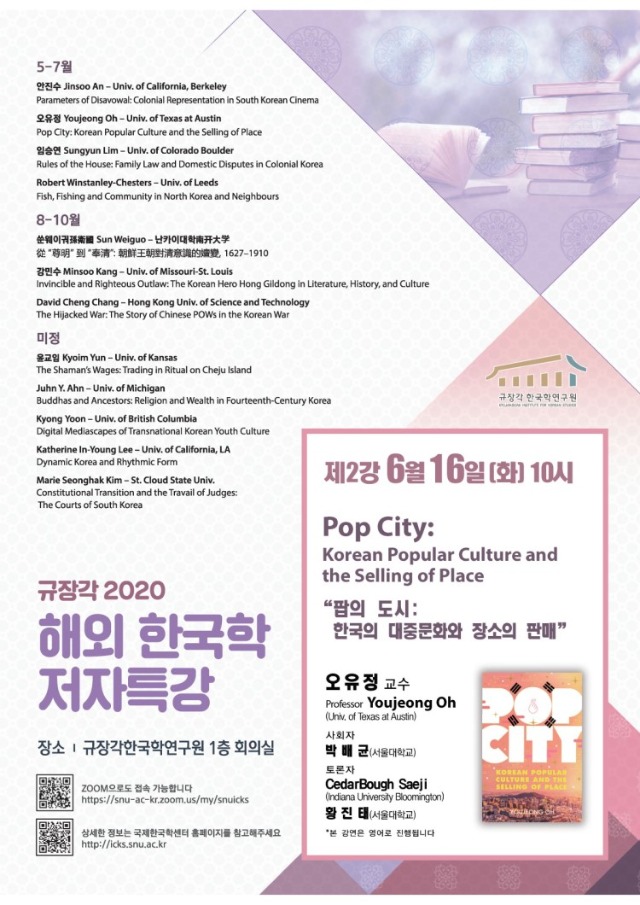게시판
06일성록워크숍/심포지엄
해외 한국학 저자특강 2020_제2강 <팝의 도시: 한국의 대중문화와 장소의 판매>
안녕하세요. 규장각한국학연구원에서 개최하는 <해외 한국학 저자특강 제2강>을 안내해 드립니다.
https://forms.gle/RXeXE6RtvsK3MCGt6에서 참가신청을 해 주시면, 행사 하루 전에 ZOOM 접속 링크를 보내드립니다.
현장 참여를 원하시는 분(선착순 15명)께서는 icks@snu.ac.kr로 이름, 소속, 연락처를 보내주시기 바랍니다.
많은 관심과 참여를 바랍니다.

저자소개:
오유정 (Youjeong Oh)
오유정은 UC Berkeley에서 지리학 박사학위를 취득한 후, 현재 the University of Texas at Austin, Department of Asian Studies에서 조교수로 재직 중이다. 현재 진행 중인 연구는 제주도의 관광개발역사에 관해서이다.
저서안내:
Pop City: Korean Popular Culture and the Selling of Place
팝의 도시: 한국의 대중문화와 장소의 판매
이 책은 대중문화를 이용한 장소홍보에 관한 연구이다. 저자는 한류의 전 지구적 확산이라는 문화적 현상과 지방자치제 활성화라는 정치적 현상의 접점을 찾아내어, 대중문화가 도시공간 마케팅에 어떻게 활용되는지 분석한다. 저서는 한국의 도시공간이 포장되고 팔리는 과정이, 텔레비전 드라마나 케이팝 아이돌이 만들어지고 팔리는 과정과 비슷하다고 주장한다. 이미지 형성에 주력하고, 투기적인 성격이 있으며, 소비자의 감정노동을 문화상품과 장소의 판매에 이용하는 방식은 자본이 얼마나 정교하게 도시공간을 상품화하는지를 보여준다.
Pop City examines the use of Korean television dramas and K-pop music to promote urban and rural places in South Korea. Building on the phenomenon of Korean pop culture, Youjeong Oh argues that pop culture-featured place selling mediates two separate domains: political decentralization and the globalization of Korean popular culture. The local election system introduced in the mid 90s has stimulated strong desires among city mayors and county and district governors to develop and promote their areas. Riding on the Korean Wave—the overseas popularity of Korean entertainment, also called Hallyu—Korean cities have actively used K-dramas and K-pop idols in advertisements designed to attract foreign tourists to their regions. Hallyu, meanwhile, has turned the Korean entertainment industry into a speculative field into which numerous players venture by attracting cities as sponsors.
By analyzing the process of culture-featured place marketing, Pop City shows that urban spaces are produced and sold just like TV dramas and pop idols by promoting spectacular images rather than substantial physical and cultural qualities. Popular culture-associated urban promotion also uses the emotional engagement of its users in advertising urban space, just as pop culture draws on fans’ and audiences’ affective commitments to sell its products. Oh demonstrates how the speculative, image-based, and consumer-exploitive nature of popular culture shapes the commodification of urban space and ultimately argues that pop culture–mediated place promotion entails the domination of urban space by capital in more sophisticated and fetishized ways.
